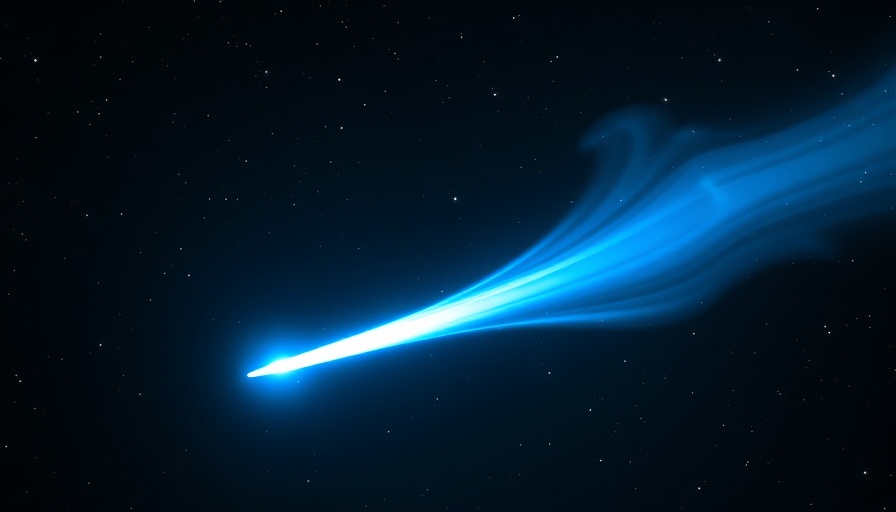
NASA’s Cool Response to Extraterrestrial Claims
In a recent deep dive into cosmic anomalies, NASA squashed the notion presented by Harvard astrophysicist Avi Loeb regarding the interstellar object 3I/ATLAS, suggesting it's an alien probe. Instead, NASA's lead scientist for small solar system bodies, Tom Statler, reiterated that this object behaves just like a comet. With this development, it's essential to sift through the excitement surrounding extraterrestrial life and recognize scientific rigor in these discussions.
Decoding the Claims: What is 3I/ATLAS?
Discovered in July, 3I/ATLAS is only the third interstellar object detected in our solar system and marked the latest in a series of intriguing discoveries that prompt discussions about life beyond Earth. Loeb has advanced theories that posit the object as a sophisticated design from an extraterrestrial civilization, suggesting that it might send out miniature probes to explore our solar neighborhood. However, Statler insists, "It looks like a comet; it does comet things. It's a comet." This contrast highlights the ongoing debate between scientific skepticism and speculative theories.
The Scientific Method Versus Speculation
Loeb's claim isn't entirely unfounded as interstellar objects can yield crucial insights into the makeup of other solar systems and the potential for life beyond our planet. Statler acknowledges the intriguing properties of 3I/ATLAS, including its unusual chemistry and trajectory, but steadfastly maintains that the simplest, most plausible assumption is that it is simply a comet. In an age where sensational headlines often prevail over scientific accuracy, this serves as a reminder of the importance of empirical evidence.
Learning from Historical Context: The Case of 'Oumuamua
This isn’t the first time a claim of extraterrestrial origin has surfaced regarding interstellar objects. Back in 2017, the first interstellar object to enter our solar system, 'Oumuamua, sparked similar alien theories, with Loeb leading the charge. The object’s erratic behavior fueled arguments that it might be an artificial construct. Yet, as further studies unfolded, it became evident that 'Oumuamua shared more characteristics with known celestial bodies than initially thought. The scientific community's response to these claims has been constructive, advancing our understanding while tempering the allure of sensationalism.
Counterarguments: The Need for Open Minds
Loeb remarkably argued for an open-minded approach to such discoveries, suggesting that dismissing anomalous data without investigation is shortsighted. He stated, "An open-minded scientist will be thrilled to learn something new with an underlying sense of humility." This sentiment resonates profoundly, particularly in contemporary science, where innovative thinking can lead to groundbreaking insights. However, such openness must be balanced with rational skepticism and a commitment to scientific principles.
Future Trends: The Increasing Detection of Interstellar Visitors
NASA projects that detecting interstellar visitors like 3I/ATLAS will become more commonplace as our observational technology improves. Statler mentioned, "We’ve just recently had the ability to discover them," implying that with advancements, more peculiar bodies crossing our solar system will likely emerge. Business owners should take note of the implications this holds for various industries, including astronomy, technology, and even tourism.
Implications for Small Business Owners
For small business owners, the fascination with space technology and exploration presents both challenges and opportunities. Companies engaged in aerospace, education, or tech fields could harness public interest in interstellar phenomena to bolster their marketing strategies or innovate their offerings. The dialogue surrounding extraterrestrial life fosters creativity and can inspire new products or services rooted in those discussions.
Conclusion: Embrace Scientific Inquiry
NASA’s stance on 3I/ATLAS echoes a vital attitude towards scientific inquiry—one that requires us to analyze the facts carefully while remaining curious. As we await future discoveries, let’s embrace both the potential for extraterrestrial life and the essence of scientific method that drives understanding. Engage with your community, explore new ideas, and perhaps consider how the ongoing exploration of our universe could inspire your next business venture.
 Add Row
Add Row  Add
Add 




Write A Comment